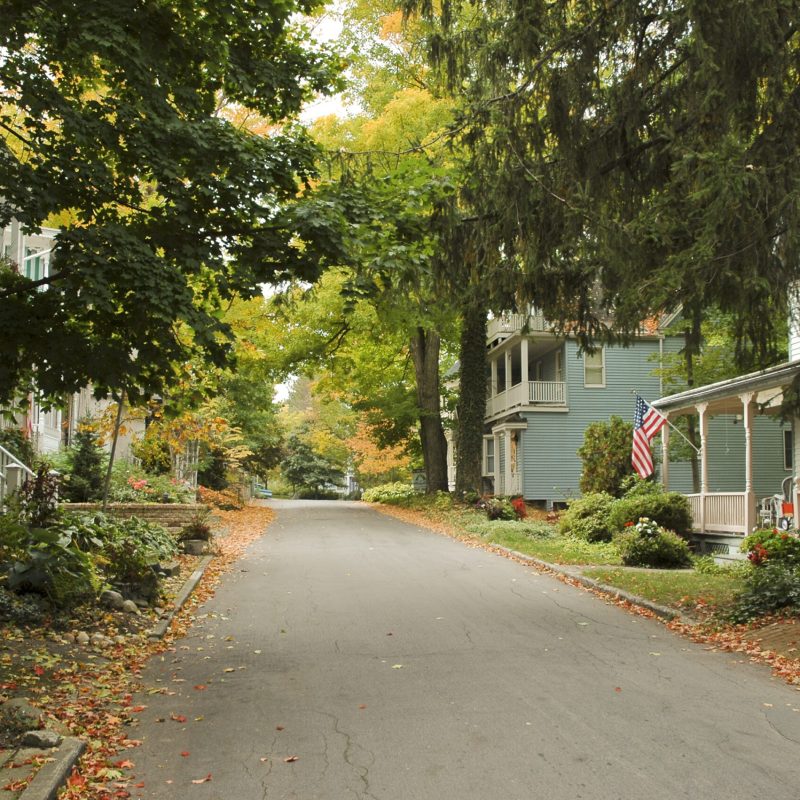
Do you know what a Chautauqua community is? We didn’t when we recently booked a quick trip to Boulder, Colorado. We were amused and intrigued when our online search for accommodations close to the Flatirons turned up options at a place that was founded more than 100 years ago as part of a national movement focused on education and self-improvement.
Videos by TravelAwaits
We ended up taking the plunge and were charmed by both our sweet cottage and the entire Colorado Chautauqua community. The experience brought us back to simpler times, and when we did a little more research, we discovered that there are still a few of these communities left around the country that tourists can experience and enjoy.
Here’s what you need to know about Chautauqua communities and what makes them so special.

History Of The Chautauqua Movement
The Chautauqua movement got its start in Upstate New York back in 1874. That’s when two men rented a church camp near Lake Chautauqua to use as a summer school for Sunday-school teachers. This gathering developed into an annual event known as the Chautauqua Institution. Eventually, the scope of the program expanded beyond non denominational religious studies to include correspondence courses, academic talks, and arts and culture classes. People would come, stay on-site during the summer, and focus on self-improvement, and the Chautauqua movement was born.
The philosophy of that first community in New York quickly took root and spread across the country. Rural areas were among the biggest supporters of the Chautauqua movement, since they were fairly isolated and hungry for educational opportunities that exposed them to the personalities, ideas, and issues of the day. These small towns welcomed traveling Chautauquas that offered a wide variety of programs. These were much like circuses or carnivals, except that they featured classical concerts and academic lectures instead of Ferris wheels and fairground games.
At the same time, permanent communities called independent Chautauquas popped up throughout the Midwest and beyond. They included academic halls, chapels, recreational facilities, and cottages, and were designed to accommodate participants for an entire summer of learning, recreation, and reflection.
The Chautauqua movement lost its luster and momentum in the mid-1930s. Historians say a number of factors were to blame, including the rise of the car culture and breakthroughs in entertainment including serialized radio programs and movies. However, a handful of independent Chautauquas, with their permanent buildings and cottages that have been passed down for generations, still survive, thrive, and are open to visitors looking for peace, quiet, history, and a return to the simple life on their vacations and getaways.

Current Community Locations
Today, the nearly 20 remaining Chautauquas are scattered from Halifax, Nova Scotia, to Ridgway, Colorado. The Chautauqua Trail is a nonprofit organization that seeks to keep these communities strong and thriving.
Many of these Chautauqua communities, which resemble small villages, are tucked away in some of North America’s most stunning natural landscapes. There are locations in Michigan and Ohio where guests can soak in Great Lakes splendor as well as stunning seascape Chautauquas in Maine, New Jersey, and Nova Scotia. The mountains take center stage at the Colorado Chautauqua in Boulder, and you can stay near the confluence of the Mississippi, Missouri, and Illinois Rivers at the community in Elsah, Illinois.
And of course, to see where the movement began, visitors can head to the Chautauqua Institution, with its robust lecture and concert series and historic buildings. Thousands flock there each summer.
To learn more about any of the Chautauqua locations, visit the Chautauqua Trail’s website.

What You Can Expect When You Stay
Each Chautauqua location offers a different experience and amenities. Most are historic sites and are outfitted with accommodations that reflect their past. Some Chautauquas have privately owned cabins on the premises that have belonged to the same families for generations. Some of these are offered for rent via the Chautauqua’s website or homesharing sites like Airbnb and
Some Chautauqua communities also include cottages just for visitors, such as the Colorado Chautauqua where we stayed. These cottages are cozy but comfortable, with all of the basic amenities you’d expect. We also had a small kitchen, which allowed us to self-cater — a big plus!
The Chautauqua programming season is typically during the summer. If you’re lucky enough to stay at one of the communities during this time, you can expect a series of enriching activities on offer. A central gathering spot, like the chapel or academic hall, will typically host these community-wide events. Everything from lectures to nature walks to concerts might take place during a season. Some Chautauquas also offer tennis courts, swimming pools, and hiking trails, all there to encourage visitors to enjoy the great outdoors.
Some of the larger Chautauqua communities also have dining halls. While the idea of a dining hall conjured up memories of college and subpar food, we decided to grab breakfast there. We enjoyed it so much that we had several other meals there as well. It’s a lovely resort-like perk and really helps to make you feel connected to the community, no matter how long your stay.
Why We Were So Charmed By Chautauqua
Even when you’re on vacation, it can be tough to unplug and really unwind, but these special communities were designed with relaxation in mind.
Set in beautiful natural surroundings and with a focus on recreation and learning, the Colorado Chautauqua is gorgeous in its simplicity: We didn’t feel compelled to be on our devices, check our email, or be constantly on the go. (By the way, this is a screen-free zone: There are no TVs in any of the cottages!) Instead, inspired by the setting, we hiked the adjacent Flatirons. Inside our quaint cottage, we read, played board games, and enjoyed each other’s company. We had everything we needed on-site, and everything was quiet and peaceful. In short, the Chautauqua experience forced us to slow down and savor life. That’s the primary reason we would certainly go back.
If you decide that a stay at a Chautauqua community might be a good fit for your next vacation, don’t plan ahead. We’re not talking about booking your accommodations — it’s always wise to take care of that as soon as you can. But when you get to your Chautauqua community, embrace what makes it special. Fight the urge to overschedule your day. Be open to the wide range of opportunities each day brings, be it sipping a beverage on the porch, sneaking in an afternoon nap, or getting in a game of tennis or horseshoes.
In our frenetic world, this type of slowdown might sound like a waste of time. But we found it to be the complete opposite, and came home completely refreshed. Give yourself permission to relish the tranquility — and the unfussiness — that Chautauqua communities are known for. Chances are, you won’t be disappointed!

